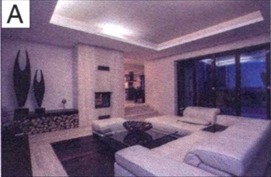
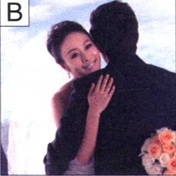
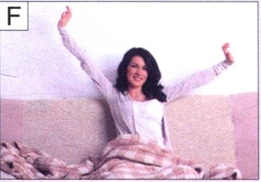
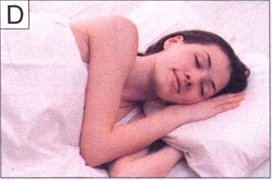
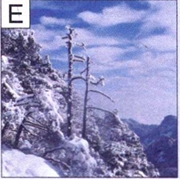
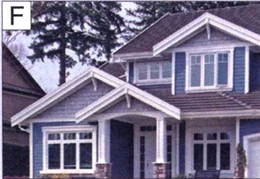
课文 Text
1 在教室 In the classroom 12-1
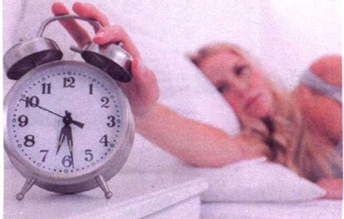
Nǐ měi tiān zǎoshang jǐ diǎn qǐ chuáng?
A: 你每天 早上 几点起 床?
Liù diǎn duō.
B: 六 点 多。
Nǐ bǐ wǒ zǎo qǐ yí gè xiǎoshí.
A: 你比我早起一个小时。
Wǒ shuì de yě zǎo, wǒ měi tiān wǎnshang shí diǎn jiù shuì jiào. Zǎo shuì zǎo qǐ shēntǐ hǎo.
B: 我 睡 得 也 早,我 每 天 晚 上 十 点 就 睡 觉。早 睡 早 起 身 体 好。
English Version
A: When do you get up every morning?
B: A few minutes past six.
A: You get up one hour earlier than I do.
B: I go to bed early also, at 10 o’clock every night. It’s healthy to keep early hours.
- New Word
- 1. 得 de part.
- used after a verb or an adjective to introduce a complement of result or degree
2 在朋友家 At a friend’s home 12-2
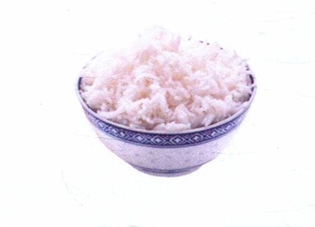
Zài lái diǎn er mǐfàn ba, nǐ chī de tài shǎo le.
A: 再 来 点 儿 米 饭 吧,你 吃 得 太 少 了。
Bù shǎo le, jīntiān chī de hěn hǎo, tài xièxie nǐ le.
B: 不 少 了,今 天 吃 得 很 好,太 谢 谢 你 了。
Nǐ zuò fàn zuò de zěnmeyàng?
A: 你 做 饭 做 得 怎 么 样?
Bù zěnmeyàng, wǒ qīzi bǐ wǒ zuò de hǎo.
B: 不 怎 么 样,我 妻 子 比 我 做 得 好。
English Version
A: Have more rice, please. You ate too little.
B: Not a little actually. I’ve enjoyed the meal a lot. Thank you so much.
A: How well can you cook?
B: Not very well. My wife is a better cook than I am.
- New Word
- 2. 妻子 qīzi n.
- wife
3 在家门口 At the door of the house
Xià xuě le, jīntiān zhēn lěng.
A: 下雪了,今天真冷。
Yǒu líng xià 10 dù ba?
B: 有零下10度吧?
Shì a, nǐ chuān de tài shǎo le, wǒmen jìn fángjiān ba.
A: 是啊,你穿得太少了,我们进房间吧。
Hǎo ba.
B: 好吧。
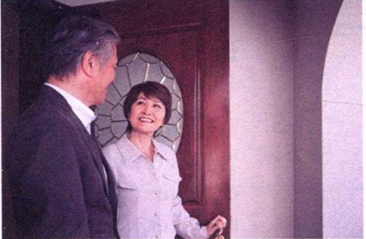
A: It’s snowing. It’s really cold today.
B: The temperature may be 10 degrees below zero, am I right?
A: Yes. You wear too little. Let’s go inside the house, OK?
B: OK.
3. 雪 xuě n. snow
4. 零 líng num. zero
*5. 度 dù n. degree
6. 穿 chuān v. to wear, to put on
7. 进 jìn v. to enter, to come/go in
4 在家里 At home
Nǐ zài máng shénme ne?
A: 你在忙什么呢?
Wǒ dìdi ràng wǒ bāng tā zhǎo ge fángzi, xiànzài tā jiā lí gōngsī yǒudiǎnr yuǎn.
B: 我弟弟让我帮他找个房子,现在他家离公司有点儿远。
Zhù de yuǎn zhēn de hěn lèi!
A: 住得远真的很累!
Shì a, tā yě xīwàng néng zhù de jìn yīdiǎnr.
B: 是啊,他也希望能住得近一点儿。
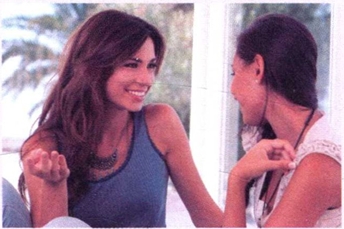
A: What are you busy with?
B: My younger brother asked me to find an apartment for him. He now lives far from the company.
A: It’s really exhausting to live far.
B: It’s true. He also wants to live nearer.
8. 弟弟 dìdi n. younger brother
9. 近 jìn adj. near, close
注释 Notes
1 程度补语 Complements of Degree
程度补语是用来表示程度的,在形式上常用结构助词 “得” 连接程度补语,补充、说明动作进行的程度或事物性质、状态所达到的程度。也有不用 “得” 连接的情况。例如:
A complement of degree describes the degree of something. The structural particle “得” is often used to introduce a complement of degree which makes remarks on the extent or degree an action or the quality or state of something has reached. Sometimes “得” is not used. For example:
| Subject | Predicate | ||
|---|---|---|---|
| V | 得 | Adj | |
| 他 | 说 | 得 | 很好。 |
| 我 | 起 | 得 | 很早。 |
| 我 | 睡 | 得 | 也早。 |
如果有宾语时,要把宾语提前,或者重复动词。例如:
If the verb takes an object, the object should be put before the verb, or the verb be reduplicated. For example:
| Subject | Predicate | |||
|---|---|---|---|---|
| (V + ) O | V | 得 | Adj | |
| 他 | (说) 汉语 | 说 | 得 | 很好。 |
| 我 | (写) 汉字 | 写 | 得 | 很好。 |
| 姐姐 | (唱) 歌 | 唱 | 得 | 不错。 |
表示否定时,要把否定词放在结构助词 “得” 的后边。例如:
In the negative form, the negative word should be put after the structural particle “得”. For example:
| Subject | Predicate | ||
|---|---|---|---|
| V | 得 | 不 + Adj | |
| 他 | 说 | 得 | 不好。 |
| 我 | 起 | 得 | 不早。 |
| 我 | 住 | 得 | 不远。 |
| Subject | Predicate | |||
|---|---|---|---|---|
| (V + ) O | V | 得 | 不 + Adj | |
| 他 | (说)汉语 | 说 | 得 | 不好。 |
| 我 | (写)汉字 | 写 | 得 | 不好。 |
| 姐姐 | (唱)歌 | 唱 | 得 | 不太好。 |
程度补语的疑问形式是在结构助词 “得” 的后面使用 “Adj + 不 + Adj”,构成正反问句。例如:
In the interrogative form, “得” is followed by the structure “Adj + 不 + Adj”, forming an affirmative – negative sentence. For example:
| Subject | Predicate | ||
|---|---|---|---|
| V | 得 | Adj + 不 + Adj | |
| 他 | 说 | 得 | 好不好? |
| 姐姐 | 起 | 得 | 早不早? |
| 你 | 住 | 得 | 远不远? |
“比” 字句(2) The “比” Sentence (2)
如果动词带程度补语,“比” 可以放在动词前,也可放在补语前。例如:
If a verb takes a complement of degree, “比” can be put before the verb or the complement. For example:
| A | 比 | B | V + 得 + Adj |
|---|---|---|---|
| 他 | 比 | 我 | 学得好。 |
| 姐姐 | 比 | 我 | 跑得快。 |
| 我妻子 | 比 | 我 | 做得好。 |
| A | V + 得 | 比 | B | Adj |
|---|---|---|---|---|
| 他 | 学得 | 比 | 我 | 好。 |
| 姐姐 | 跑得 | 比 | 我 | 快。 |
| 我妻子 | 做得 | 比 | 我 | 好。 |

Comments